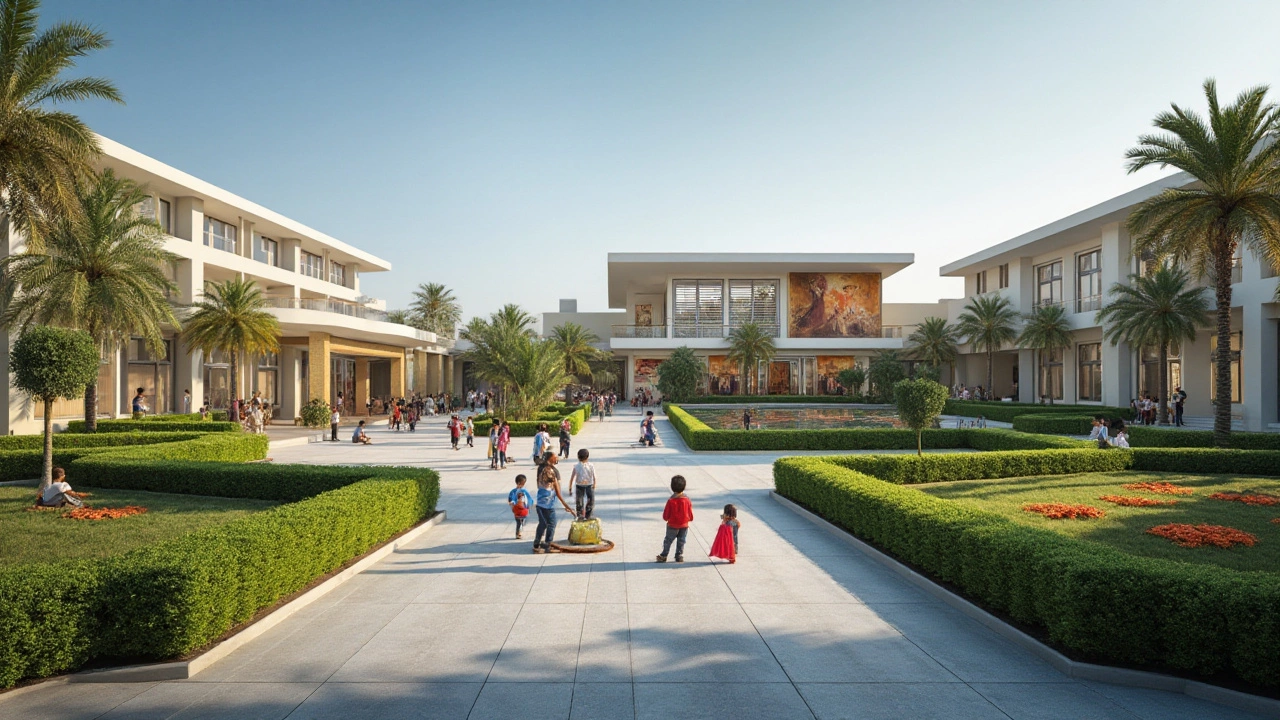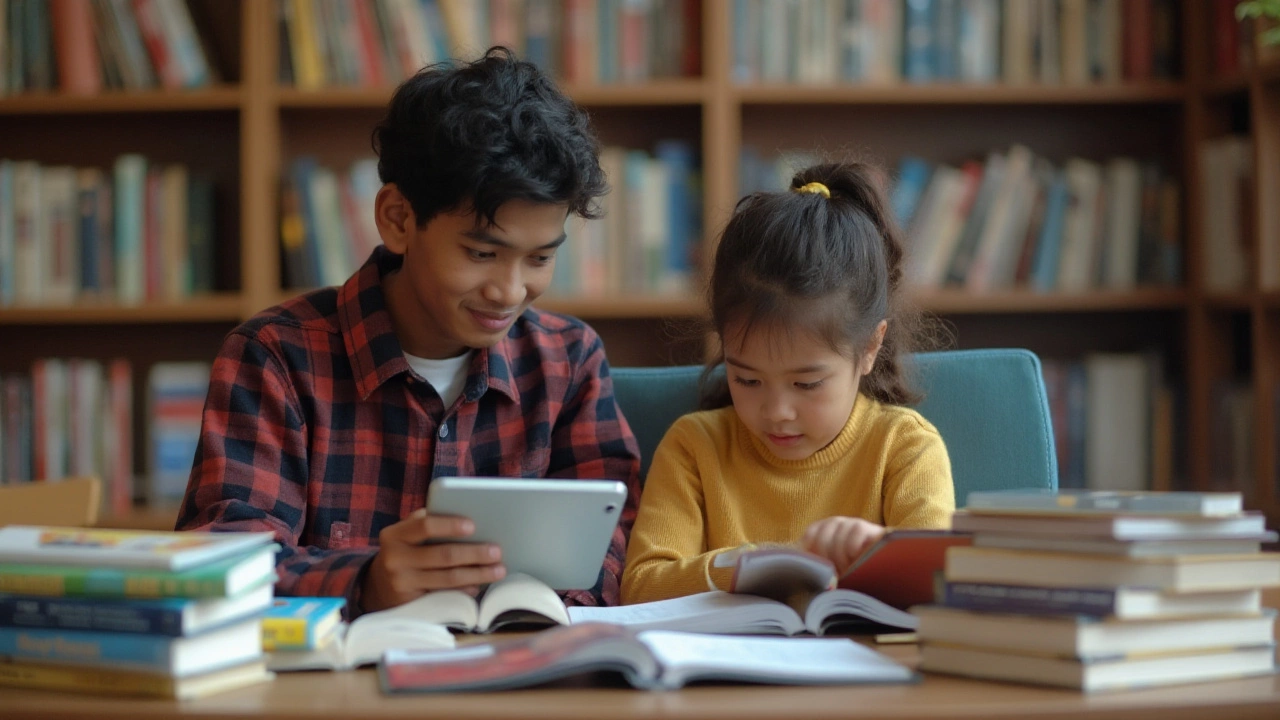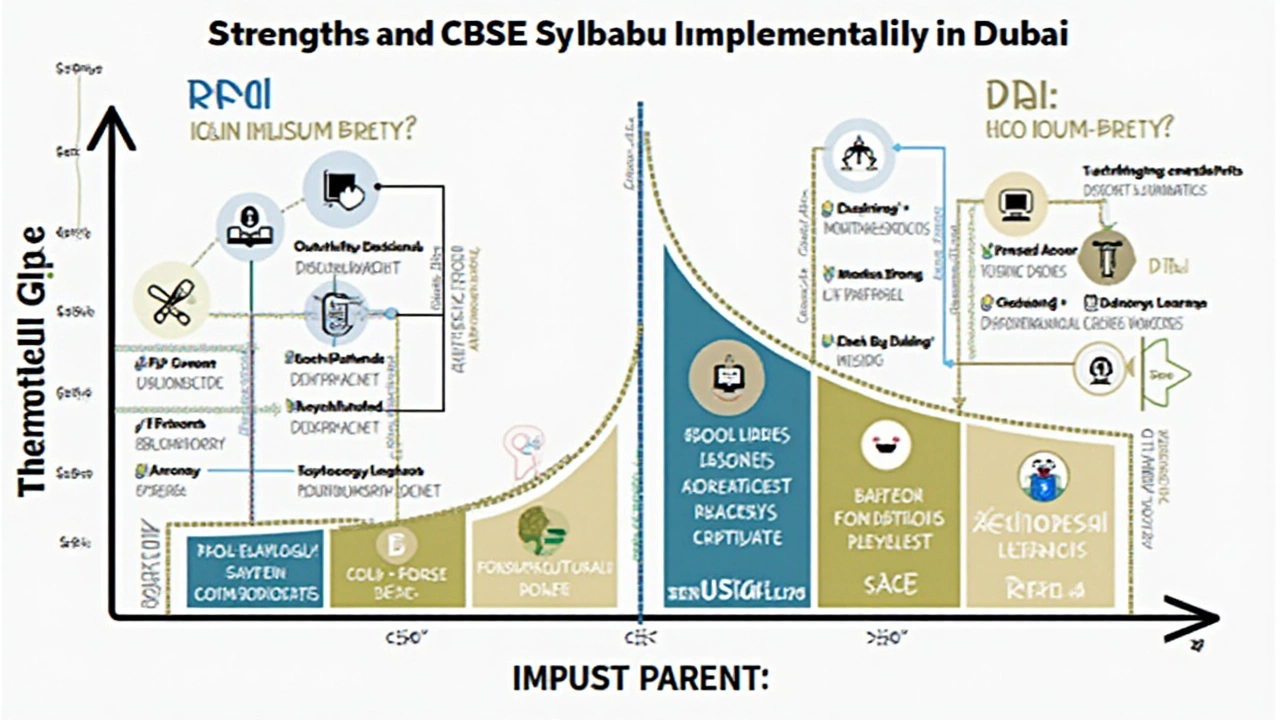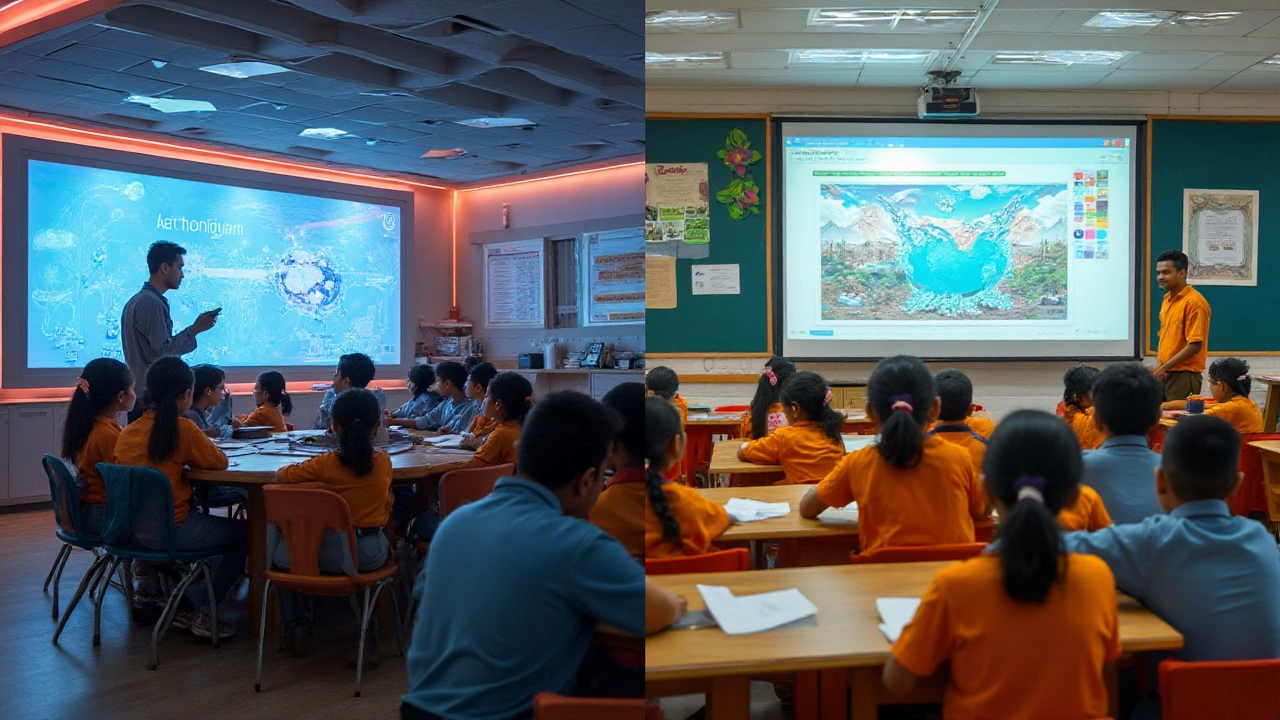Choosing the ideal educational setting for your children can feel akin to navigating a labyrinth, especially when it involves selecting between international options. For parents pondering whether the CBSE syllabus in Dubai provides a more advantageous experience than in India, it's crucial to weigh several aspects.
Education is a pivotal part of any child's life, and with the increasing mobility of families and globalization, the debate over where the best education can be received has never been more relevant. In this article, we'll explore the nuances of the CBSE educational system in both Dubai and India.
From teaching methodologies to student facilities and support systems, both regions offer unique advantages and face respective challenges. By digging into these elements, this passage aims to arm parents with insights to help them make the best educational choice for their offspring.
- CBSE Curriculum Overview
- Dubai's Educational Landscape
- India's Traditional Approach
- Choosing the Right Path
CBSE Curriculum Overview
The Central Board of Secondary Education, commonly known as CBSE, offers a globally recognized education framework that's been at the forefront of educational development in India. Established more than nine decades ago, the CBSE syllabus is known for its structured approach that emphasizes not only academic excellence but also holistic development. This curriculum is widely adopted across various schools in India and has become a popular choice in international schools, including those in Dubai, offering an education system that balances academics and extracurricular activities.
CBSE aims to provide students with a sturdy foundation in core subjects such as Mathematics, Science, and English, while also incorporating arts, social studies, and physical education to nurture diverse interests. Its focus on concept-based learning rather than rote memorization has been a significant reason for its growing global acceptance. One of the standout features of the CBSE board is its emphasis on uniformity of education across different regions, ensuring all students have access to similar curricular materials, assessments, and teaching methodologies.
An intriguing aspect of the CBSE syllabus is its continuous and comprehensive evaluation (CCE) approach, which assesses students through various formats such as quizzes, projects, and assignments, alongside traditional examinations. This ensures a student's performance is measured diversely, supporting those who may show strengths outside conventional testing. A notable shift in recent reforms includes a greater emphasis on critical thinking, creativity, and communication skills to gear students up for real-world challenges. Acclaimed author Sudha Murty once noted,
The CBSE board's focus on skill development and moral ethics is progressive, equipping students not just with textbook knowledge but with life skills.
In comparison to other curriculums, CBSE often includes a well-thought integration of technology within the educational process. Schools following this board in both India and Dubai regularly update their teaching materials to include digital content, interactive sessions, and online resources, preparing students for a technology-driven world. The regular updating and revising of the curriculum also underscore its commitment to keeping education relevant and in tune with modern advancements.
Education systems like those in Dubai and India, which adopt CBSE, offer structured success paths for students aiming for higher education. These schools establish an environment conducive to nurturing and expanding the young minds of tomorrow. Critical evaluation of the CBSE curriculum uncovers the great potential it holds in fostering world-class education consistent across borders. As the education system evolves, so too does the CBSE syllabus, adapting and innovating to meet the contemporary needs of its students.

Dubai's Educational Landscape
When envisioning the educational landscape in Dubai, one is instantly reminded of the city's commitment to merging tradition with modernity. The educational system here reflects the cosmopolitan spirit, serving an eclectic mix of native and expatriate communities with unwavering dedication. The CBSE syllabus is well-integrated within Dubai's framework, offering Indian expatriate families a sense of familiarity coupled with an assurance of quality. Schools here prioritize a well-rounded approach, ensuring students not only excel in academics but also blossom in extracurricular domains, from science clubs to performing arts.
The government in Dubai continuously invests in educational infrastructure, ensuring that institutions are equipped with state-of-the-art facilities. With interactive smart boards replacing conventional blackboards and an increasing emphasis on digital literacy, the focus is noticeably on future-ready education. Moreover, the teacher-to-student ratio is carefully maintained to allow personalized attention, a feature that remains a point of attraction for numerous families. Schools often partner with reputed educational bodies worldwide, organizing exchange programs and international collaborations, further enhancing the learning experience.
"In Dubai, we find an educational synergy between knowledge proliferation, cultural depth, and technological advancement," says Dr. Faisal Anees of the Dubai Knowledge & Human Development Authority.
Additionally, the UAE Ministry of Education plays a pivotal role in ensuring that the CBSE syllabus aligns with international education standards. Regular workshops and training sessions for educators ensure that teaching methods are continually evolving and adapting to global trends. Another noteworthy aspect of schools in Dubai is their focus on innovation and entrepreneurship; students are often encouraged to participate in national and international competitions, testing their mettle against a diverse cohort.
For parents weighing the pros and cons, the financial aspect can be significant. Education in Dubai, while offering a rich and varied experience, comes with its set of costs. Tuition fees can be significantly higher compared to other regions, demanding a thoughtful evaluation in terms of value and investment. However, families residing in Dubai frequently affirm that the long-term benefits provided by the rich educational opportunities justify the expenditure. Ultimately, the city's educational landscape provides an enriching environment for students, fostering both academic excellence and cultural inclusiveness.

India's Traditional Approach
India's educational system, particularly in the context of the CBSE syllabus, has often been viewed through a lens of tradition and deeply embedded academic principles. In a country where education is considered a vital part of socio-economic advancement, the pressure and competition are palpable. The CBSE system, which stands for the Central Board of Secondary Education, has long stood as a pillar of standardized learning. This ensures uniformity across various schools in India, allowing students from diverse backgrounds to receive a consistent quality of education. Within Indian households, there's a deep-rooted belief in the merits of hard work and rigorous academic discipline, which is often reflected in the heavy emphasis on examinations and high-stake learning assessments.
The typical Indian classroom under the CBSE system is characterized by a traditional teacher-centric approach where educators often play the role of authority figures imparting knowledge. While this can create a structured environment advantageous for foundational learning, it may also limit opportunities for creative expression and critical thinking in students. A notable feature of the CBSE in India is its frequent revision of curriculum to include up-to-date content, ensuring that students are learning relevant material. However, the heavy reliance on rote memorization has been a topic of debate.
According to a report by the Associated Chambers of Commerce and Industry of India, "Over 88% of the parents prefer CBSE-affiliated schools for their children due to the perceived rigor and transferability of the curriculum."
India's educational facilities range widely, from urban schools with modern amenities to rural establishments that may struggle with basic resources. This disparity is critical to understanding the different educational experiences children might face within the same national system. Apart from academics, Indian schools are focusing more on extracurriculars and overall student wellness, though the change is gradual. The inclusion of activities such as yoga, sports, and arts in the CBSE curriculum is a step towards a holistic approach, aiming to balance intellectual and personal growth. Despite these strides, the pressure on students in India to excel in academic fields remains significant, often driving families to invest in supplementary coaching classes.
Balancing Tradition with Modernity
In recent years, there has been a concerted effort to blend traditional education methods with contemporary pedagogical practices. Educational reforms have emphasized the need for conceptual understanding and application of knowledge rather than mere rote learning. The introduction of skill-based subjects relevant to current economic and technological trends indicates a shift towards adapting the education system to a fast-evolving world. This includes courses such as computer science, artificial intelligence, and interdisciplinary studies which are gaining traction among CBSE schools in India. As the government and educational boards work on these adjustments, the aim is to prepare students not just for national challenges, but to compete and collaborate internationally. Though this evolution is ongoing, India's commitment to maintaining its educational standards while slowly integrating new methodologies showcases its dedication to nurturing future generations in a comprehensive manner.
Choosing the Right Path
When it comes to selecting the optimal educational setting for your child, every parent grapples with the daunting question of what environment will provide the most enriching experience. Between Dubai's education system and India's education, both offer unique landscapes that cater to different needs, compelling parents to consider several factors that play a crucial role in their decision-making process. This journey requires a look beyond mere academic performance to include aspects like cultural exposure, extracurricular activities, and the holistic development that education is meant to foster. Many parents also emphasize the importance of a nurturing environment that can cater to their child's specific learning needs, something which both these regions strive to offer in their own capacities.
In Dubai, students often benefit from state-of-the-art facilities and resources that are sometimes unavailable in traditional Indian schools. The cosmopolitan nature of the city introduces students to multicultural environments, potentially broadening their worldviews. However, this comes with its share of challenges, like adapting to a diverse peer group and the pressure of maintaining high academic standards in a highly competitive setting. It's important for parents to weigh these elements, considering how their child adapts to such environments and what balance of academics and personal growth is desirable for them.
On the flip side, India's education system, particularly through the CBSE syllabus, offers a robust foundation with its aggressive focus on core subjects. The intensive curriculum primes students for competitive exams and often aligns well with educational aspirations for higher studies within the country. However, there's more to consider than just academic rigor. Elements like the support system within schools, peer group dynamics, and the teacher-student relationship can significantly affect student satisfaction and performance. Recent reports highlight that India has been focusing on incorporating a more holistic educational approach by emphasizing life skills and creative thinking, a shift that could offer long-term benefits beyond textbook learning.
"Education is what remains after one has forgotten what one has learned in school." – Albert Einstein
To arrive at an informed decision, it's essential for parents to reflect on what they envision as the goals of education for their child. For some, the aim is academic excellence tailored towards university admissions, while others might seek a well-rounded individual development, blending academics with social and emotional learning. Discussions with educational consultants or interacting with families who have experience in both settings can provide invaluable perspectives. Education fairs often present opportunities to get a real sense of what's on offer and can equip parents with concrete information from various schools.
Another crucial factor to consider is the financial implication of choosing between these regions. The cost of education in Dubai, with its often higher infrastructure costs, can be significantly different from that in India. Balancing affordability with quality is an important consideration for many families. As parents deliberate over these choices, it's pivotal to remember that there is no one-size-fits-all solution. Each child's needs, aspirations, and adaptability are different, and the right path hinges on a thoughtful examination of these unique requirements. In navigating this crucial decision, the guiding principle remains achieving an environment where the child can thrive, explore, and tap into their fullest potential.
